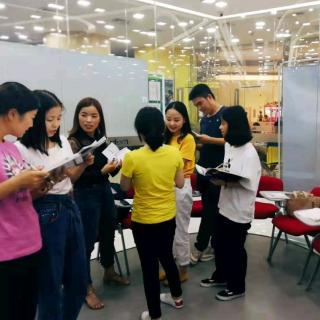
介绍:
【EM4-LP3A At the Market, A: At the Market 】 Meten, Longhua, SZ, LT: Yoga Yu
(今天没有送娃上学,上班前赶着录完的,最近M4的课有点多,不得不录,争取这个月努力录完M4,说话算话,有压力才有动力!)亲爱的听众朋友们大家好,这里是Yoga的荔枝电台FM799839,我是美联深圳龙华中心的LT Yoga,在这里为大家播讲新M4的LP3 A : At the market的课程,欢迎您的收听,希望通过我们的节目,你能够对本课有更好的预习和复习,让我们开始学习吧!
Unit Goals of Unit1: 教学目标:(1) Identify common foods.识别常见的食品; (2) Talk about things you need. 聊聊你需要的物品;
【Words and phrases: 单词和短语:】
一、课文中的单词和短语: department store百货公司;a clothing store服装店 ;a coffee
shop咖啡店; a supermarket一个超市; luxury shopping mall奢华的购物中心; Berlin柏林; Germany德国; grow成长; Otavalo 奥塔瓦洛(厄瓜多尔北部城市); Ecuador 厄瓜多尔; field领域,田野; greens绿色蔬菜; a loaf of bread一条面包, a head of lettuce一头生菜, a carton of ice cream一纸箱子冰激凌, a bunch of carrots一堆胡萝卜, rooftop屋顶, socially 在社交上地;responsible life可靠的生活, local community本地社区; instead of代替; napkin餐巾;fork叉子,spoon勺子,knife小刀,chopsticks筷子;toothpaste牙膏, soap肥皂, sunscreen防晒霜, shampoo洗发水, bandages绷带, toilet paper厕纸, vitamin维生素, matches火柴.
二、食品词汇: fresh food新鲜食品;frozen food 冷冻食品; junk food垃圾食品;
breakfast foods早餐食品, soup汤, tea茶, coffee咖啡, sugar糖, bananas香蕉,rice米饭, instant noodles方便面, potato chips薯片, bread面包, flaky cereal薄薄的麦片, ice cream冰激凌, frozen French fries冷冻法式炸薯条, chicken鸡, shrimp虾, fish鱼, soda苏打, tofu豆腐, ground beef绞碎的牛肉, salad沙拉, yogurt酸奶, cake蛋糕, butter黄油, fresh egg新鲜鸡蛋, cheese奶酪, apple苹果, grapes葡萄, tomato西红柿, carrots萝卜, lettuce生菜, orange juice橙汁;. Foods you eat every day你每日食用的食物; dessert甜点;
三、其他词汇: make a list列个单子; unusual不寻常的; besides包括在内; produce生产;
main benefits主要好处; item物品, chart图表, syllable音节, background knowledge背景知识, listen to gist听要点, shopping bag购物袋, bold words粗体字,speaking strategy 口语策略,checklist清单, reality show真人秀, stay on an island继续待在一个岛上, Pacific Ocean太平洋;
【Sentences: 句子;】
(1)询问需求:
1)—Do we need anything? 我们需要什么东西吗?
—Yes, we do. We need soda and bottled water. 是的,我们需要;我们需要苏打水和瓶装水。
Or:—No, we don’t. We (already) have everything. 不,我们不需要,我们已经什么都有了。
2)—What else do we need? 我们还需要其它的吗?
—We still need some coffee. 我们还需要一些咖啡。
Or:—Nothing. I think we’re all set. 什么都不需要,我认为一切准备就绪了。
3)—Anything else? 还有其他的吗?
—Yes,we need some bacon.——是的,我们还需要一些培根。
— No, that’s it. We have everything.。——不,够了,我们什么都有的。
4)—What do you need?–你需要什么?
—I need a loaf of bread. -我需要一条面包。
5)—What else?—还有其它的吗?
—And a head of lettuce. —还有一头生菜。
6)—Do you need a carton of ice cream?——你需要一纸箱的冰激凌吗?
No, thanks, I want a bunch of carrots.——不,谢谢,我需要一捆胡萝卜。
(2) 表达对食物的喜好:
1)—Why don’t you like soda? -为什么你不喜欢苏打水?
— Because there’s too much sugar in it. -因为里面太多糖了。
2)—How often do you eat pasta? -你多久吃一次意大利面呀?
—I usually eat pasta once or twice a week. -我通常一周吃一,两次意面。
3)—What can you find in your refrigerator? -你在你的冰箱里能找到什么?
—You can find apples, oranges or some kind of fruit in it.
-你可以找到苹果,橙子或者一些种类的水果在里面。
4)—Which do you eat more in the morning? Rice or bread? -在早上你哪个多一些,米饭还是面包?
—I eat more bread than rice. -我吃面包比米饭多。
5) —How many glasses of water do you drink everyday? –你每天喝多少杯水?
—I drink at least two glasses of water a day. -我一天至少喝两杯水。
6) —Why do you drink coffee in the morning? -你为什么在早上喝咖啡?
—I need coffee in the morning to wake up. -我早上需要咖啡让我醒来。
7) —When don’t you eat hot soup? -你什么时候不喝热汤?
—I don’t drink it in the summer.-我夏天的时候不喝(eat和drink都可以表示喝汤)。
(3) 表达某处的情况:
1)—What’s in the ocean? –海里面有什么?
— There are a lot of fish in the ocean. -海里面好多鱼。
2)—What’s on the island?–岛上有什么?
—There are a lot of coconuts and fruit trees. -这里有很多椰子和水果。
3)—What else is on the island?-这个岛上还有什么?
—There is also a lot of sand. -这里也有很多的沙子。
4)—Is there a lot of water to drink on the island? -这个岛上有很多的水可以喝吗?
—No, there is very little water to drink on the island.-不,这里只有一点点水可以喝。
5) —How’s the climate here? -这里的气候如何?
—It’s very hot in the afternoon. (100 degrees Fahrenhite / 38 degrees Celsius) -很热,下午会很热。(华氏100度或者摄氏38度)
【Dialogues: 对话】关于食物的对话;
Ken:Rachel, I’m making a shopping list for our barbecue. We have chicken. What else do we need? Rachel,我在为我们的烧烤做购物单呢?我们有鸡,我们还需要什么呢?
Rachel: Let’s see…we need some potatoes. 让我看看,我们需要一些土豆。
Ken:Okay, got it. 好的,收到。
Rachel: We also need lettuce and tomatoes for the salad. 我们还需要生菜和西红柿做沙拉。
Ken: And what about drinks? 那饮料呢?
Rachel:Let’s see…We have soda. 让我看看,我们有苏打水。
Ken: Okay. I’ll buy some juice then. See you! 好的,等会我会买些果汁,待会儿见啦!
【Grammar】:
可数和不可数名词;英语中的名词指的是一种抽象的或者具体的事物,它有可数和不可数之分。所谓可数名词指的就是在数量上可以计数,可以数出数量的事物;所谓不可数名词是指不能以数目来计算,不可以分成个体的概念、状态、品质、感情或表示物质材料的东西。
可数名词在它之前可以加上冠词a/an。而不可数名词前面是不可以直接加冠词的。可数名词变为复数形式有如下变化规律:
a.一般情况下,直接加-s,如:book-books, bag-bags, cat-cats, bed-beds ;读音:清辅音后读[s],浊辅音和 元音后读[z]。
b.以s. x. sh. ch结尾,加-es,如:bus-buses, box-boxes, brush-brushes, watch-watches ;读音:[iz]。
c.以“辅音字母+y”结尾,变y为i, 再加-es,如:family-families, strawberry-strawberries ;读音:[z]。
d.以“f或fe”结尾,变f或fe为v, 再加-es,如:knife-knives ,thief-thieves;读音:[z]。
e.以“o”结尾的词,分两种情况:
1)有生命的+es 读音:[z] 如:mango-mangoes , tomato-tomatoes, hero-heroes;
2) 无生命的+s 读音:[z] 如:photo-photos, radio-radios;
f. 不规则名词复数: man-men, woman-women, policeman-policemen, policewoman-
policewomen, snowman-snowmen, mouse-mice, child-children, foot-feet, tooth-teeth,
g.除此之外,还有一部分名词单复数同形,如:fish鱼,deer鹿,sheep绵羊,works(工
厂),means手段,Swiss瑞士人,Chinese中国人,news 新闻,goods 商品;
h.有一些名词则只有复数形式:trousers裤子,pants裤子,shorts短裤, glasses眼镜,compasses圆规,scales天平,pliers钳子;
i:“某国人”的复数有三种类型:
(1)Chinese, Japanese, Swiss 三国人单数复数同形,不需加s;
(2)Englishman, Frenchman, Dutchman复数要把 man 变为men;
(3)其他各国人以–an, -ian收尾的均直接加s。如:Americans, Australians, Indians等。 可依照这个口诀记忆:中日不变,英法变,其他”s”加后面。
J:不可数名词一般没有复数形式,只有单数形式,它的前面不能用不定冠词a / an ,若要表示它的个体意义时,一般需要将其量化。不可数名词如何量化:就是在不可数名词前面加上“数词+量词+of”,比如:a piece of bread( paper(纸), cloth(布), coal(煤), news(新闻), advice(意见), information(信息), meat(肉) )an item of information 一则情报 ,a slip of paper 一张纸条a length of cloth 一段布料 ;a cake of soap 一块肥皂; a tube of tooth-paste 一条牙膏; a bottle of ink 一瓶墨水等。
K: 当量词可数,且前面的数词大于一时,量词需要用复数形式,如two bottles of water 两瓶水 , two pieces of paper 两张纸 等;同时,可数名词也有相应用法,如:a box of apples 一箱苹果 , six boxes of apples 六箱苹果等。
L: 最常见的不可数名词有:advice, baggage, change(零钱), furniture(家具), hair, homework, information, knowledge, luggage(行李), money, news, progress, traffic;
M: 其它不可数名词还有:absence, age, anger, courage, energy, equipment, experience, failure, fear, food, fun, health, ice, industry, kindness, labour, luck, marriage, music, nature, paper, peace, pleasure, power, pride, rain, research, respect, safety, salt, sand, silence, sleep, strength, snow, technology, time, trade, transport, travel, trust, truth, waste, water, wealth, weather, wind等。
上面提到的可数名词和不可数名词并不是一成不变的。英文中的很多词都是一词多义,名词也不例外,同是一个词在一种情况下是可数名词,而在另一种场合却是不可数名词,
如:可数名词: a tin 一只罐头 a relation 亲属 an iron 一把熨斗 a democracy民主国家 a glass 一只玻璃杯 a beauty美人,美的东西 A wood 一片树林
不可数名词: tin 锡 relation 关系 Iron 铁 democracy民主 glass 玻璃 beauty 美 Wood 木头;
大家还在听

